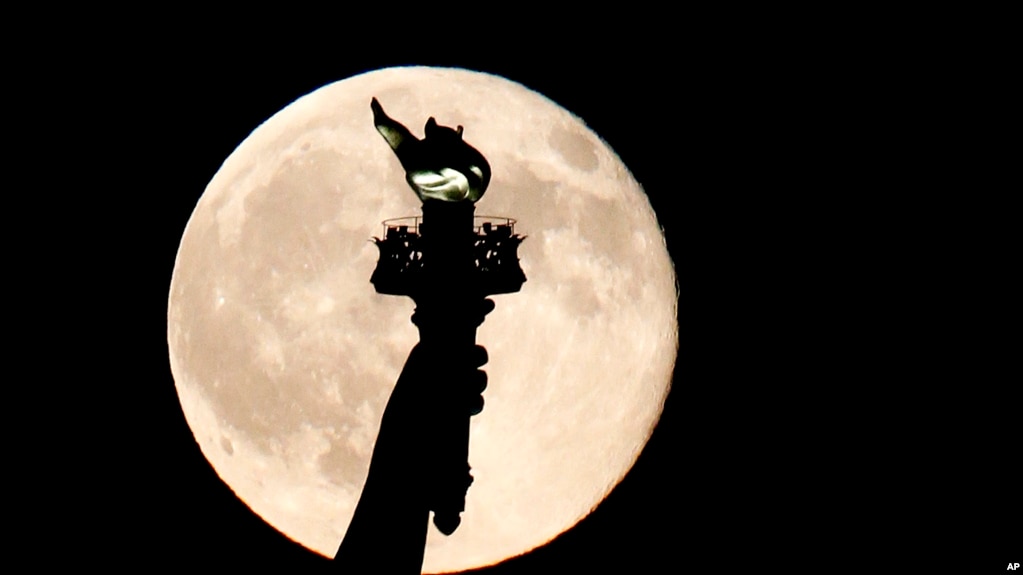昨夜、何気なく見たMoon!!
な、な、なんとまさに”Blue Moon"!!!
綺麗~でしたよ。みなさんもご覧になりましたか?
ハロウィンの満月は実に46年ぶりとのこと。
国立天文台によると、10月31日の満月は2020年で最も地球から遠い満月、「マイクロムーン」とも呼ばれます。2020年、地球に最も近い満月だった4月8日と比べると、見た目の直径は約14%小さく、明るさは約30%も暗いそうです。しかもことし最も小さな満月。
2、3年周期でしか見れないブルームーン現象。
’見れたら、幸せになれる’ のだそうな(^^♪
そして、2018年はその奇跡が2度。次は9年後か、あるいは17年後だそうですよ。
やっぱり、お月さまは。。。Eternity !!
- Billie Holliday singing “Blue Moon.”
- Patsy Cline singing “Blue Moon.”
- 2020”Blue Moon"
- 'Once in a Blue Moon'
- Words in This Story
(極めて稀なこと、決してあり得ないこと)
'Once in a Blue Moon'

2015年7月31日のファイル写真 ニュージャージー州ジャージーシティのリバティ州立公園から見た自由の女神の聖火の後ろにブルームーンが昇る。 ブルームーンは、同じ月の間に月が満月で2回昇るときに起こる。(AP Photo/Julio Cortez)
今日は月の現象、つまり月の出来事についてです。ブルームーンと呼ばれるものです。
ブルームーン
心に夢も描けず
心に愛も抱けず
ブルームーン...
アメリカ航空宇宙局(NASA)の専門家が、この月のイベントについて説明しています。彼らが言うには、ブルームーンとは4つの満月がある季節の”余分な”月であると。
NASAのウェブサイトによると、"1940年代以降、用語 "ブルームーン "は、暦月に2つ目の満月に使われれている"とあります。これは通常、2年半ごとにしか起こりません。
NASAの専門家は、青い月は実際には色が青いわけではないと説明しています。事実、それは通常の毎月の満月と同じように見えます。
青い月が違うのは、それがそれほど頻繁に空に現れないということです。そして、英語の表現としてはこんな感じで使われています。
"blue moon "とは、長い、あるいは長く見える期間のこと。
何かが "once in a blue moon "で起こると言ったら、それは珍しい、めったに起こらない、まれなことを意味します。それは非常にめったに起こらないことなのです。これらの言葉はすべてごくまれに起こる何かを表しています。
例えば、私は普段から忙しくしています。それで仕事をしていないときは、歌を歌ったり、物語を書いたり、本を読んだりするのが好きです。でもたまには、何もしないこともあります。だからごくまれに、ソファに座って映画を見たり、ポップコーンを食べたりしている私が見れるでしょう。
別の例を挙げましょう。
あまり会わなくなった友人がいるとします。そんな時、 you see him once in a blue moonごくまれに彼に会うの、と言えます。話をして以来、永遠のように感じます。まるでdropped off the face of the Earth地球上から消えてしまったかのように! 同じくこう言えますね、彼に会って以来、永遠に続いているとも。
永遠は長い時間です。だから、 forever and a day 永遠はもっと長いのです!(永遠を超えた永遠。永遠の強調)そして、あなたがあなたの友人を見て以来、forever and a day 永遠だったのです。彼がいなくて寂しいのね! 電話した方がいいわ。
そして最後に最後の例。もし忙しかったら、英語の練習をする時間がなかったかもしれません。でも、覚えておいて、ごくたまに練習しただけでは、なかなか英語が上達しないかもしれないということを。
ケンタッキーの青い月よ、輝き続けてくれ
去って行き僕をブルーにさせた、あの子を照らすんだ
ケンタッキーの青い月よ、輝き続けてくれ
去って行き僕をブルーにさせた、あの子を照らすんだ
Billie Holliday singing “Blue Moon.”
Patsy Cline singing “Blue Moon.”
2020”Blue Moon"
見逃してしまった人へ
次回は 2023年 8月 31日 です!!!
'Once in a Blue Moon'
 In this July 31, 2015, file photo, a blue moon rises behind the torch of the Statue of Liberty seen from Liberty State Park in Jersey City, N.J. A blue moon happens when the moon rises in its full stage twice during the same month. (AP Photo/Julio Cortez)
In this July 31, 2015, file photo, a blue moon rises behind the torch of the Statue of Liberty seen from Liberty State Park in Jersey City, N.J. A blue moon happens when the moon rises in its full stage twice during the same month. (AP Photo/Julio Cortez)
Today we are talking about a lunar phenomenon – a moon event. It’s called a blue moon.
Experts at the U.S. National Aeronautics and Space Administration (NASA) explain this lunar event. They say a blue moon is the "extra” moon in a season with four full moons.
The NASA website says that “since the 1940s, the term ‘blue moon’ has also been used for the second full moon in a calendar month.” This usually happens only every two-and-a-half years.
The NASA experts explain that a blue moon is not actually blue in color. In fact, it looks the same as a regular monthly full moon.
What makes a blue moon different is that it does not appear in the sky that often. And this is how we use it as an English expression.
A “blue moon” is a long or seemingly long period of time.
If I say something happens “once in a blue moon,” it is uncommon, infrequent, rare. It happens very seldom. These words all describe something that happens once in a blue moon.
For example, I usually keep busy. So when I’m not working, I like to take sing songs, write stories or read books. But sometimes, I just like to do nothing. So, once in a blue moon, you’ll find me on the couch, watching movies and eating popcorn.
Here’s another example.
Let’s say you have a friend who you do not see very much anymore. You can say you see him once in a blue moon. It feels like an eternity since you have talked. It’s like he has dropped off the face of the Earth! You can also say it has been forever since you have seen him.
Forever is a long time. So, forever and a day is even longer! And it has been forever and a day since you have seen your friend. You miss him! You should call.
And finally, here is our last example. If you have been busy, you may not have had time to practice your English. But just remember, if you only practice once in a blue moon, your English may not improve very quickly.
So, join us again next week for another Words and Their Stories! Until next time … I’m Anna Matteo.
Anna Matteo wrote this story for VOA Learning English. Bryan Lynn was the editor. The song at the beginning of the program is Billie Holliday singing “Blue Moon.” The song at the end is Patsy Cline singing “Blue Moon.”
_________________________________________________
Words in This Story
lunar – adj. of or relating to the moon
phenomenon – n. something (such as an interesting fact or event) that can be observed and studied and that typically is unusual or difficult to understand or explain fully
infrequent – adj. not happening often : not frequent
rare – adj. very uncommon
seldom – adj. not often : almost never
eternity – n. time that seems to be without an end